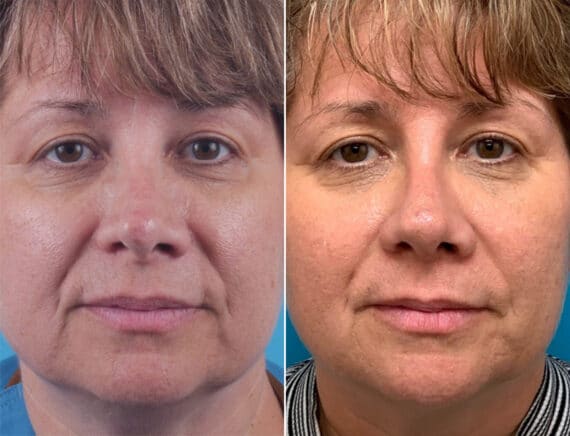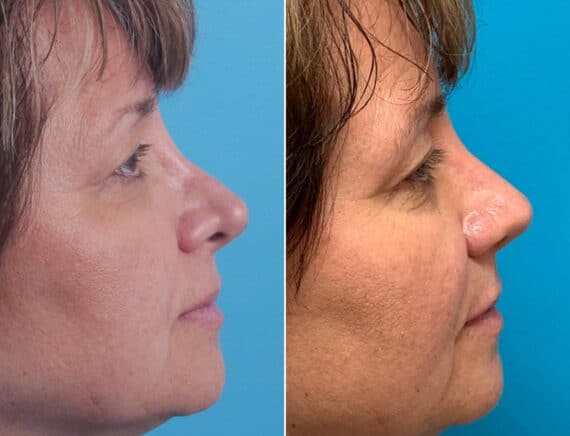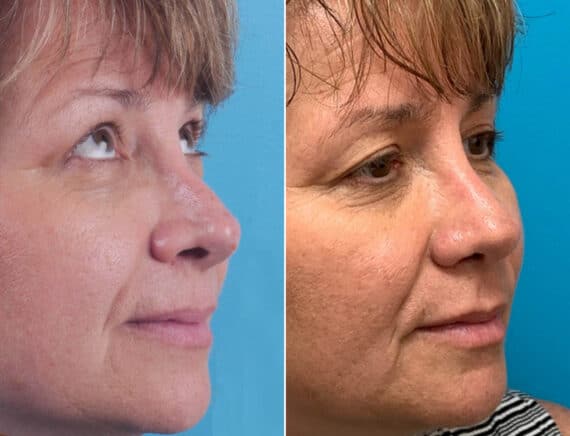Home » Thick Skin and Revision Rhinoplasty: What You Need to Know
Thick Skin and Revision Rhinoplasty: What You Need to Know
Posted by Becker Plastic Surgery
Have you ever wondered why some people struggle to see the refined results they hoped for after a nose job? Thick skin revision rhinoplasty is often the solution for those whose initial procedure didn’t deliver the definition they expected. This plastic surgery topic raises important questions about anatomy, healing, and realistic outcomes.
When the skin plays a major role in shaping the final appearance of the nose, understanding its influence becomes essential. As you read on, you will discover how skin thickness affects both primary and revision rhinoplasty, why certain results are harder to achieve, and what makes a successful revision possible.

Why Did My First Rhinoplasty Surgery Fail?
A previous rhinoplasty can fall short for several reasons, especially when skin thickness was not fully considered during surgical planning. Thick nasal skin can obscure delicate refinements, while overly thin skin may reveal even minor imperfections. Healing responses, such as fibrosis, can also distort surgical modifications made during the first procedure. Understanding these factors helps patients set realistic expectations and recognize why a revision may be necessary.
The Structural Paradox in a Primary Rhinoplasty Procedure
Patients with thick skin often assume their nose still looks too large because an inexperienced rhinoplasty surgeon failed to remove enough cartilage or bone. In reality, the opposite is true. Thick skin can collapse inward after surgery, masking definition and making the nose appear bulky. To improve these outcomes, revision procedures often require cartilage grafts to create a new nasal structure that lifts and supports the skin rather than allowing it to drape heavily.
Understanding this paradox is essential for revision patients because refining a thick-skinned nose rarely means taking more away. Instead, the surgeon must build a stronger nasal framework that stretches the skin and sharpens contours. This approach is sometimes more invasive and may involve rib grafting, but it is necessary to achieve changes that meaningfully affect the final rhinoplasty results.
Understanding Fibrosis in Primary Rhinoplasty Surgery
Revision patients with thick skin are not only dealing with naturally resilient tissue but also with skin that has been previously traumatized. After a primary procedure, thick skin often forms dense scar tissue in the dead space left behind, creating a rounded or bulbous nasal contour that patients frequently hope to correct. This buildup can distort the intended nasal shape and even contribute to a noticeable nasal deformity.
Correcting this issue requires the surgeon to carefully remove old scar tissue while reshaping the underlying structures. Preventing fibrosis from returning is one of the most challenging parts of revision surgery, as the skin is predisposed to scarring again. This sets the stage for the importance of meticulous postoperative care, including taping and steroid injections, which help maintain the new contour and support long-term improvement.
Revision Rhinoplasty Patient Results



* All patients are unique and individual results may vary.
How Does Skin Thickness Affect Rhinoplasty Revision?
Because nasal skin thickness or thinness directly influences how the tissue heals and drapes over the underlying support, surgeons must tailor their rhinoplasty techniques accordingly. Each type of rhinoplasty requires a unique surgical approach to achieve balanced definition without compromising structure. Understanding the patient’s specific skin characteristics allows the surgeon to design a surgical plan that aligns with the anatomical challenges and ultimately improves both function and appearance.
Surgical Techniques for Thick Nasal Skin
Thick skin patients often require an additive strategy rather than a reductive one. Because heavy nasal tip skin can blur or soften definition, the surgeon must rely on structural rhinoplasty methods that strengthen the underlying nasal structure. This usually involves placing cartilage grafts that push gently against the skin, creating highlights, contours, and a more refined profile that would not be achievable through reduction alone.
A key part of this process is building a supportive framework that compensates for the weight and thickness of the skin. By reinforcing the nasal tip and dorsum, the surgeon ensures that the new shape remains visible as the tissue heals. This structural approach allows the nose to maintain definition over time, even in patients whose skin naturally masks fine detail.
Surgical Techniques for Thin Skin Noses
Patients undergoing thin skin rhinoplasty require a strategy focused on smoothing and camouflaging rather than creating bold structural definition. Because this skin type reveals even the smallest contour changes, the surgeon must cushion the framework carefully to prevent visible edges or irregularities beneath the surface. This cosmetic procedure often relies on soft tissue grafts or finely layered materials that help blend transitions and achieve a more natural appearance.
A major goal in refining thin skin is to protect the nasal framework while still enhancing shape and proportion. By subtly masking potential imperfections and softening transitions, the surgeon ensures that the final result complements the patient’s delicate skin type. This approach allows the nose to maintain refinement without exposing underlying details that were never intended to be visible.
Surgical Techniques for Normal Skinned Noses
Patients with normal skin thickness generally follow principles similar to the thin skin technique, with emphasis on balanced refinement and subtle smoothing. In many cases, the same camouflaging methods are applied, just adjusted to suit the patient’s individual characteristics.
The Role of Skin Thickness in the Rhinoplasty Recovery Process
For thick-skinned revisions, the surgery is only 50 percent of the battle. While the recovery may seem similar to a standard rhinoplasty, revision rhinoplasty patients should understand that achieving a stable surgical outcome requires additional post-surgical care. Thick skin tends to hold swelling longer and is more prone to forming excess scar tissue, which is why long-term follow-up, steroid injections, and taping become essential parts of the process.
The role of Kenalog (Steroid Injections)
Kenalog injections play a critical role in managing thick skin during revision recovery because they help control excess scar tissue that can obscure definition. These injections are typically administered in small, precise doses over several months to reduce swelling and prevent the skin from creating new bulk in areas where refinement is needed. By keeping inflammation in check, Kenalog supports smoother healing and more predictable post-surgical results.
Why taping matters more for thick skin
Taping becomes especially important after nasal surgery for patients with thick skin because it helps guide the way the tissue settles during healing. Consistent taping provides gentle external pressure that reduces swelling, limits the formation of excess scar tissue, and encourages the skin to conform to the underlying structure. This simple but essential step supports long-term refinement and helps maintain the improvements achieved during revision surgery.
Unsatisfactory Results After Rhinoplasty?
Experience world-class treatment from our top-rated providers at Becker Plastic Surgery.
Does Skin Thickness Affect Revision Rhinoplasty Cost?
Skin thickness can influence revision rhinoplasty pricing because it often determines the level of complexity involved in achieving a stable and refined result. Thick-skinned revisions typically require additional structural grafting, more extensive contouring, and longer postoperative care, all of which may increase the overall treatment investment. These cases also demand greater precision to address scarring, swelling, and definition challenges.
An experienced surgeon will tailor the surgical plan to your unique anatomy and discuss how your skin characteristics may affect both the procedure and its cost. While not every thick skin revision is more expensive, many do require extra time, materials, or follow-up treatments to achieve the intended improvement.
Consult with a Thick Skin Rhinoplasty Expert
Choosing the right facial plastic surgeon is essential when pursuing revision rhinoplasty, especially in cases involving challenging skin thickness. An experienced surgeon understands the nuances of healing, scar tissue response, and structural refinement, all of which contribute to safer outcomes and improved cosmetic concerns.
At Becker Plastic Surgery, our rhinoplasty specialist team brings exceptional expertise rooted in decades of focused training and advanced surgical technique. Patients seeking precision in complex revisions trust our surgeons for their deep understanding of nasal anatomy and tailored approach to each case. To take the next step, visit our contact page to schedule a consultation or explore our locations page to find the phone number for your nearest office.